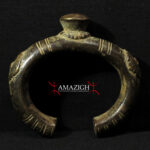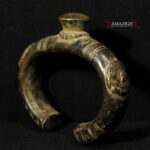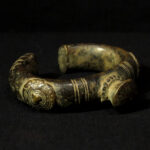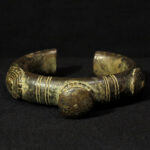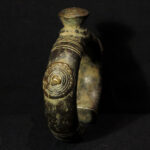Antique Bronze Bracelet – Mossi / Nyonyose – Burkina Faso
Early 20th century. Bronze grams 304,4 (42.82 oz.). Cm. 8,0 high x cm. 8,4 width (4.13″ x 5.12″).
The Mossi are a Gur ethnic group native to modern Burkina Faso, primarily the Volta River basin.
According to oral tradition, the Mossi come from the marriage of a Dagomba princess and Mandé hunter.Yennenga was a warrior princess, daughter of a Dagomba king in the upper east region of present-day Ghana. The story has it that while exploring her kingdom on horseback, she lost her way and was rescued by Rialé, a solitary Mandé hunter. They got married and gave birth to a son, Ouedraogo, who is recognised as the father of Mossi people.
Mossi society is divided vertically into two major segments: the descendants of the horsemen who conquered the peoples on the Mossi plateau are called the Nakomse, and all Mossi Napa’s (kings) come exclusively from the Nakomse class. These people use figures as political art to validate their rule over the peoples they conquered. The descendants of the ancient farming peoples who had occupied the land from the beginning of time and who, by right of first occupation, were and are the owners of the land are called the Tengabisi (“people of the earth”). These Tengabisi can be further divided into groups of smiths (Saya), groups of traders (Yarse) and, most important, groups of farmers (Nyonyose). Generally the smiths and the traders do not use masks, but the Nyonyose are the principal makers and users of masks in Mossi society.
m22w
- Additional information
Additional information
| Weight | 450 g |
|---|






